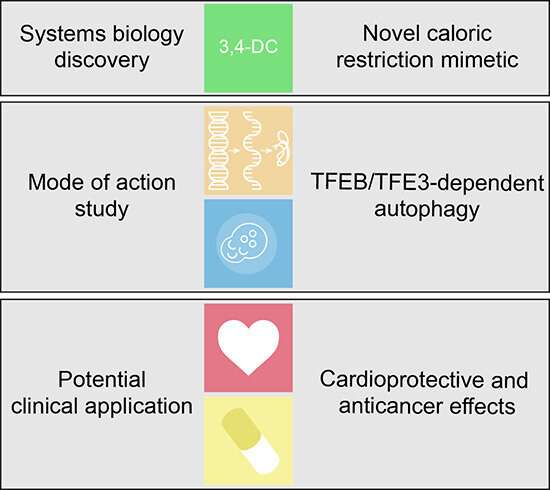Exploring the effect of fasting on age-related diseases

There are many indications that fasting promotes longevity. In recent years, much attention has been devoted to so-called caloric restriction mimetics (CMRs), substances that simulate the health-promoting effects of fasting without the need of life-style change. In a study published in EMBO Molecular Medicine, a research team led by Oliver Kepp and Guido Kroemer at the French Medical Research Council (INSERM) reports the identification of a novel candidate CRM. The substance may prove useful in the further research for the treatment of age-related diseases.
The first experimental evidence that fasting can prolong lifespan is more than a century old. Since then, researchers have confirmed these findings in many different species. When cells are starved, they stop growing and rather invest into a self-clearing process called autophagy in which they recycle their own cellular waste. Autophagy rejuvenates the cells and rids them from toxic and misfolded proteins. More recently, Kroemer and other research teams have shed more light on the molecular mechanisms behind this phenomenon.
While caloric restriction is probably one of the most effective measures for lifespan extension in animal models, it is difficult to pursue in real life. However, current research indicates that the consumption of certain substances has a similar effect. In previous work, Kroemer and his colleagues demonstrated that so-called caloric restriction mimetics (CRMs) such as spermidine and resveratrol can also induce autophagy. The anti-aging effect of these agents has been demonstrated in a variety of species from yeast to worms and on to mice. In addition, spermidine has been correlated with human longevity and reduced cardiovascular and cancer-related mortality.
To uncover more CRMs, Kroemer and his team now tested 200 compounds that belong to the same class of substances as spermidine and resveratrol. They first examined which of these substances show cellular reactions characteristic of elevated autophagy in rat and human cell cultures, while not being toxic to the cells. An agent called 3,4-dimethoxy chalcone (3,4-DC) stood out as the best candidate. A closer look at the exact mode of action of 3,4-DC revealed that it induces autophagy through a different pathway than spermidine and resveratrol.
The researchers then investigated the effect of 3,4-DC on living animals. To this end, they injected the substance into mice. They found that it protects against myocardial infarction and that it reduces the growth of tumors in the context of certain chemotherapeutic agents. Both effects have previously been associated with autophagy and with CRMs such as spermidine and resveratrol.
It remains to be seen whether 3,4-DC has similar effects in humans. However, the study is a proof of principle that the researchers' approach to testing substances in cell culture is a fast and efficient way to identify new CRM candidates with diverse modes of action.
More information: Guo Chen et al. 3,4‐Dimethoxychalcone induces autophagy through activation of the transcription factors TFE 3 and TFEB, EMBO Molecular Medicine (2019). DOI: 10.15252/emmm.201910469



















